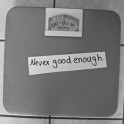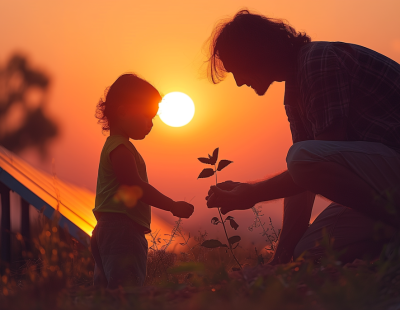My mind is still a battlefield. The sides? Self-acceptance and self-hatred. The soldiers? Thoughts of the challenges I've overcome and thoughts of burying myself again in restrictions. The victor? It depends on the day. Anorexia, upon reflection, was inevitable. It took root when I was 8 years old and crying in bed because I thought I was fat. It blossomed when I was 10 after my dad commented that the mashed potatoes I was eating contained carbs, which would make me gain weight. It permeated my mind when a boy's eyes flitted over my body and told me I had big thighs. It began to guide my daily routine until people started to compliment my appearance. Then, it took over. Anorexia was never a voice in my head; it was more of a silent dictator. It rewarded me with an overwhelming feeling of satisfaction when my aunt compared me to a Barbie doll or my ex-boyfriend proudly exclaimed that I had the physique of a mannequin. It punished me when I disobeyed its orders. Even when I considered it my closest friend, I knew that it ruled me. I tried to "give it to God" so many times, but I was slowly destroying the body that He had given me. I stopped worshipping God because I had sold my soul to the scale. 130. 125. 120. High school graduation. 115.110. Holidays. 115. Compulsive exercise and starvation. 110. My mother's death. 105. Binges. Anxiety. Fear. Emptiness. Nothing. No emotion, no expression, nothing but the feeble cries of a body that was dying. I was dying, and I loved it. Here's the thing about Barbie dolls and mannequins though: they're incredibly fragile. And, like them, my body began to break from the blows anorexia had dealt it. My binges became frequent and aggressive. My body was trying so desperately to save itself that I felt compelled to eat anything in sight. Eating entire jars of nut butter or pints of ice cream became a regular, dreaded part of my daily routine. Even when I tried to throw up after finishing these monster meals, my body said "Hell no." I gained fat, muscle, more fear, more anxiety, and more support as I told more and more people about the demon that had dominated my life since I was 8 years old. Then, a miracle: my body began to regenerate. I slept for 10 hours each night. My period came back. I reluctantly began seeing a dietitian. A therapist came soon after. And the whole time, the number on the scale rose. Starvation didn't work anymore. I was a different shape physically, but my hatred remained unchanged. I hated myself through the pounds I lost, and I hated myself through the pounds I gained. And here I am, finally physically well and mentally sound, but still battling this mass of hatred in my chest. Do I hate myself? Maybe I can't decide where the hatred should really go. I could direct it toward my mom, but she only wanted to feel more beautiful. She didn't know that the medicine she took after undergoing cosmetic surgery would ultimately kill her. I could use the hatred to attack the society that pressured both of us to strive towards unattainable standards, but that wouldn't bring me real relief. I could talk through the hatred objectively with a therapist over thousands of appointments, but that wouldn't make it dissipate. I could take to social media in search of wisdom to diffuse the hatred, but the words of comfort bounce right off. So my immediate impulse is to internalize the hatred, aiming it inward towards myself. Eat a little less, move a little more, because those are the instructions anorexia sometimes still whispers when self-acceptance seems to be losing the battle. Maybe skip a meal. Or a day. A few days. Never eat again. If I shrank physically, maybe my feelings would shrink too. My mind was too exhausted to dwell on emotional pain when it was fighting to feed itself. That was nice. Sometimes I miss being numb. But, as I said, my Barbie body broke. My present and future are now undeniably human. Starvation wouldn't shrink me. I would remain the same size, and the hatred would only grow. A body that doesn't cooperate is an easy target for hatred. I can't go back to that; I won't go back to that. Of course, as self-hatred and self-acceptance continue to wage war, I also have to recognize that I own the battlefield. I supply the artillery for both sides, so I can determine the outcome of the battle. I choose self-acceptance. And, so help me God, it will be victorious.
By Dave Holmes, Esquire Now we're getting somewhere. This Saturday, roughly half a million people are expected to descend upon Washington, D.C., for the March For Our Lives, a student-led demonstration to curb gun violence in America. There are over 800 satellite marches being planned in cities and towns across the country. As the gun control and school safety issues reach a critical mass, the teenagers who forced the conversation will make their voices heard. And their voices are furious, clear, and absolutely correct. We have marched before, but this one feels different. This one feels like we've reached a tipping point. The National Rifle Association is on the ropes. Just one year ago, 45 percent of Americans viewed the NRA positively, with 33 percent viewing them negatively. According to a poll taken earlier this month, now it's 40 percent negative to 37 positive. Maybe it's because they've chosen as their public face one Dana Loesch. Maybe it's the apocalyptic overreach of NRA TV, in which the world is a bullet-riddled hellscape that can only be survived by stockpiling military-grade weapons. Or maybe it's just that the truth can't be ignored this time: we are the only country on Earth where mass shootings happen with anywhere near this frequency, and that fact is directly attributable to the NRA's influence on our government. They are shoveling money toward our politicians, while our kids and their teachers go through active-shooter drills and wonder whether they'll be next. God help us. It is not like we're incapable of action. Just this week, Broward County Schools Superintendent Robert Runcie announced new security measures, which include identification badges which students will be required to wear at all times, and—I swear to God—government-issued clear backpacks, which will be the only backpacks students will be allowed to use. In a letter to students and their families, Runcie said, “We want to assure you that the safety and security of our students and employees remain our highest priorities.” Think about that: prioritizing kids' safety and security means requiring clear backpacks, which incidentally are too small to house an AR-15, before lifting a finger to limit access to assault weapons. That's where we are right now. The image is almost too perfect: We are literally forcing our baggage on these kids. In an op-ed for NBC News this week, Bill Murray compared the Parkland teenagers to the college students who led protests against the Vietnam War: "It was the students who made all the news,” Murray wrote, “and that noise started, and then the movement wouldn't stop.” And he's right: sometimes it takes the petulance and moral clarity of a teenager to make an adult see the truth. That we are still, in 2018, openly debating whether there should be more or fewer guns in schools, while we force privacy-obliterating luggage on them, stands as proof that the adults in the room have dropped the ball. We can move this thing, but we all have to start pushing. Show up this weekend. To find out where your local march is taking place, put your zip code in here. We've failed our kids for long enough. Now we have to get in line behind them.








